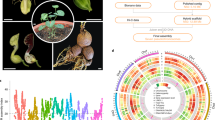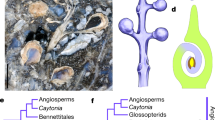Abstract
IN a book just issued1, Dr. Hagerup, of Copenhagen, has revived the much-debated question of the origin of the Angiosperms, basing his conclusions on a detailed, comparative study of the organogeny of the floral structures in a series of representative species of the Gnetales, Piperaceæ and Juglandaceæ. From this investigation he derives support for the belief in the close relationship of the Piperaceæ and the Gnetales, the differences between them being, in his view, of minor importance morphologically ; so that either the Gnetales should be added to the Angisosperms, as Lignier contended, or the Piperaceæ should be regarded as having arisen directly from gymnospermic ancestors through the Gnetales, as the author himself maintains.
This is a preview of subscription content, access via your institution
Access options
Subscribe to this journal
Receive 51 print issues and online access
$199.00 per year
only $3.90 per issue
Buy this article
- Purchase on SpringerLink
- Instant access to the full article PDF.
USD 39.95
Prices may be subject to local taxes which are calculated during checkout
Similar content being viewed by others
References
Hagerup, “Zur Abstammung einiger Angiospermen durch Gnetales und Coniferae". Copenhagen, 1934.
Maüle, Bei. Wise. Bot., 4, 166; 1901.
Crocker, Bot. Gaz., 95, 168; 1933.
Author information
Authors and Affiliations
Rights and permissions
About this article
Cite this article
McLEAN, R., EVANS, M. The Maüle Reaction and the Systematic Position of the Gnetales. Nature 134, 936–937 (1934). https://doi.org/10.1038/134936c0
Issue date:
DOI: https://doi.org/10.1038/134936c0



